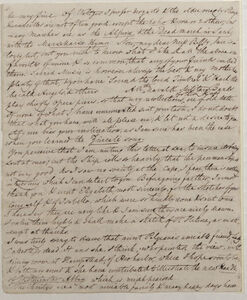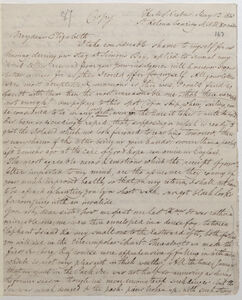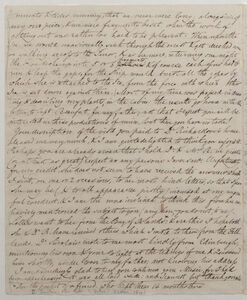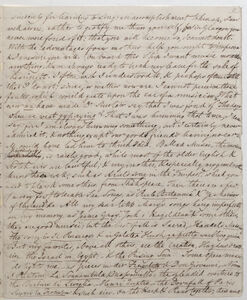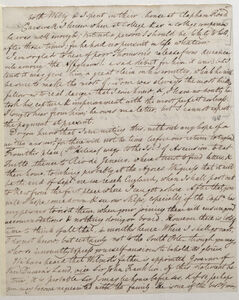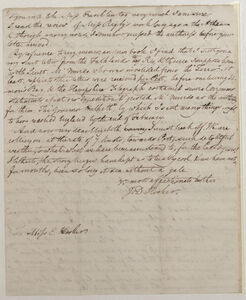This letter will be despatched to JDH's sister Elizabeth on arrival at St Helena. JDH is glad to hear that Elizabeth's health has improved. JDH tells how the last Christmas was spent in a dense fog near Elephant Island. The HMS 'Erebus' spent January in the pack ice working against strong currents & tides. Crossing to the HMS 'Terror' over ice bergs on foot proved treacherous. JDH spent his time drawing & describing plants, the results are now sent to their father, William Jackson Hooker, through Captain Beaufort. Discusses Elizabeth's visit to the Richardson's house & his correspondence with Mrs Richardson. Is glad that Elizabeth is continuing with her music & has learnt to sing. JDH misses music though he is not knowledgeable about it. Dr Sinclair is under the impression that JDH likes the song 'The days when we went gypsying' but he generally prefers old airs to modern ballads. He specifically mentions Ariel's song from Shakespeare's TEMPEST & the sea songs: 'Rule Britannia', 'Yer Mariners of England' & the songs their sister Mary used to play. He declares sacred music to be the best, especially Handel's 'Messiah', he mentions some other pieces & gives many examples of operas he admires. JDH prefers older waltzes e.g. those of Mozart & Strauss & favours marches over quadrilles. JDH thanks Elizabeth & their Aunt Palgrave for sending him their sketches. He commiserates at the death of Lady Callcott who painted a scene of Rio de Janeiro harbour, where JDH will soon be, & illustrated a handbook of Westminster Abbey. JDH mentions acquaintances: the Christys, Carswell & Thomson (recently released from captivity in Afghanistan). JDH is now on his way home via Ascension, where he will eat turtle, & the Azores. JDH anticipates Sir John Franklin will return home if Wilmot is to be Governor of Van Diemen's Land [Tasmania]. Mentions a review of Mrs Rigby's work. Reports of the expedition in the HAMPSHIRE TELEGRAPH contained errors attributed to Lieutenant McMurdo.
Transcript
be very fine. Of waltzs I prefer Mozart's & the older ones by Strauss. Quadrilles are not often good, except the Echo & one or 2 others; but many marches are, as the Alpine, & the Dead March in Saul, with the Marseillaise Hymn. Now, my dear Miss Bessy, here is a long list, but you wish to know what I like, & all the above are favourites of mine & so common, that any of your friends can lend them. Sacred music is however always the best & my mother has plenty of that, & you have "Sound the loud Timbrel" & "Hark the herald Angels", & others. All the naval & military Bands play chiefly opera pieces, so that my recollections of other kinds are of old date. If none of what I have mentioned suit your task, I do not doubt that what you have, will all please me, & let not a desire to gratify me bias your inclination, as I am sure has been the case when you learned the Zincali song.
You perceive that I am writing this letter at sea, to insure its being sent at once; but the ship rolls so heavily that the penmanship is not very good. As I saw no society at the cape, I fear there is nothing interesting which I can detail to you. Before going farther, I must thank you & aunt Elizabeth, most sincerely, for the sketches of your lovely[?] self & of Isabella, which were kindly done & sent to me. I dare say they are very like & I am sure they are nicely drawn. I value them highly & shall make a sketch of St.Helena, as an attempt at thanks.
I was truly sorry to observe that aunt Palgrave's amiable friend, Lady Callcott is dead. It was she, I think; who painted the view, in the dining room at Hampstead, of Rio Harbor, where I hope soon to be, & both my aunt & she have contributed to illustrate the new handb[ook]. of Westminster Abbey, which is much praised.
The Christys are a most amiable family & many happy days have
Copy *1
H.M.S. "Erebus" May 12, 1843
St Helena, bearing N[orth], N[orth].W[est]. 80 miles
My dear Elizabeth*2,
I take considerable shame to myself for not having, during our stay at Simon’s Bay, replied to several very kind letters, received from you, your indulgence will however suggest better excuses for me; than I could offer you for myself. All your letters were most acceptable; & numerous as they were, I could find no fault with them than the most unreasonable one, that there were still not enough! On passage to this spot (if a ship, when, sailing, could be conjectured to be in any one "spot", even for the time it takes to write the word) has been so exceedingly rapid, that, supposing a vessel is ready to quit the island which we look forward to reaching tomorrow, there is every chance of this letter being in your hands; sooner than a packet left 2 weeks ago at the Cape of Good Hope, can arrive in England.
The most agreeable news & emotions which the receipt of your letters imparted to my mind, are the assurance they convey of your much improved health, so that, on my return, I should not have to be afraid of hurting you by a short walk, nor get black looks for romping with an invalide[sic].
Your ask, dear sister, how we spent our last Xmas, it was rather a miserable one; we were then enveloped in a dense fog, between Elephant Island & a very small one to the eastward of it, both of our ships you will see in the Circumpolar Chart. Thereabouts we made the first iceberg & of course were apprehensive of falling in with more, which is not very pleasant in thick weather. All the time (January) that we spent in the pack ice, was not half as amusing as during the former season, although we never encountered such danger, but the ice was much decayed & the pack-pieces broken up, with such strong
currents & tides turning, that we never were long, alongside of any one piece, & we were frequently beset, when the work of getting out was rather too hard to be pleasant. When upon the ice, we would occasionally sink through the crust & get ducked when in walking across to the Terror, & as we were returning one night the floe broke up into 5 or 6 (portions) fragments, & of course each of us had to run & leap the gaps, for the ship would burst all the ropes by which she is attached to the ice, from the force with which other ice is set down against them. Most of my time was passed in drawing & describing my plants, in the cabin: the results go home with this letter, to Capt[ain]. Beaufort, for my father; not that I expect you will be interested in these productions of mine, but then you have no taste!
Your description of the visit you paid to Dr. Richardson's house pleased me very much, & I am quite delighted to think you enjoyed it. Perhaps you are already aware that I hold Dr & Mrs R[ichardson] in greater (or at least as great) respect as any persons I ever saw. Unfortunately for my credit, she does not seem to have received the answers which I sent, on one or two occasions, to her most kind letters, so that I fear she may be (& to all appearance justly) insulted at my ungrateful conduct: & I am the more inclined to think this from her not having mentioned the subject to you (any how, you do not, to me). Letters went to her from the Bay of Islands*3; & ere this I hope both she & Dr R[ichardson] have received others which I wrote to them from the Falklands. Dr Sinclair wrote to me most kindly from Edinburgh, mentioning his own & your delight at the tidings of me, & I answered him shortly, under cover to my father, not knowing his address. I am exceedingly glad to hear that you continue your music, for I had been apprehensive it was all laid aside: & I cannot but thank you also *4
sincerely for learning to sing; an accomplishment taken up, I am well aware, rather to gratify me than yourself, for in Glasgow you never were fond of it: that you will become so, I cannot doubt. With the advantages of our mother's help, you ought to improve & I am sure you will. On board this ship I want music more than anything, & I am always ready to break my leave for the sake of hearing it. I often wish I understood it, & perhaps oftener still that I do not; since, as matters now are, I cannot perceive these faults which would grate upon the ear of a musician. What ever can have made Dr Sinclair say that I was fond of "The days when we went gypsying" That I was humming that tune, I dare say; for I am always humming something, but I certainly never admired it, & nothing, except our goods friend's having no ear at all, could have led him to think I did. Ballad music, the modern particularly particularly, is rarely good, while most of the older English & Scotch airs are beautiful; & my mother, & especially my Grandmother, know them well; such as Ariel's Song in the "Tempest", which you used to play & some others, from Shakespeare. Then there are a few, (a very few) tolerable sea songs, as "Rule Britannia" & "Yer Mariners of England". & all my dear little Mary's songs hang imperfectly on my memory, as "Jeannie Gray", "Jock O' Hazeldean", & some others, they are good music; but the best of all is sacred, Handel's Messiah, the song in il Penseroso & in Galatea "Hush ye pretty warbling quire." But my favourites, above all others, are the Creation, Haydn's oratorios, -- the Israel in Egypt: -- & the Rising Sun. Some opera music delights me, -- as pieces in der Freyshutz[sic] [Freischütz] & Don Giovanni, -- Norma, I Puritani, la Sonnambula & Massamillo: the splendid overture to the Barbiere di Siviglia, -- Henri Quatre, -- the Downfall of Paris, Suoni la Tromba, & such airs. On the harp & piano together; these must
be very fine. Of waltzs I prefer Mozart's & the older ones by Strauss. Quadrilles are not often good, except the Echo & one or 2 others; but many marches are, as the Alpine, & the Dead March in Saul, with the Marseillaise Hymn. Now, my dear Miss Bessy, here is a long list, but you wish to know what I like, & all the above are favourites of mine & so common, that any of your friends can lend them. Sacred music is however always the best & my mother has plenty of that, & you have "Sound the loud Timbrel" & "Hark the herald Angels", & others. All the naval & military Bands play chiefly opera pieces, so that my recollections of other kinds are of old date. If none of what I have mentioned suit your task, I do not doubt that what you have, will all please me, & let not a desire to gratify me bias your inclination, as I am sure has been the case when you learned the Zincali song.
You perceive that I am writing this letter at sea, to insure its being sent at once; but the ship rolls so heavily that the penmanship is not very good. As I saw no society at the cape, I fear there is nothing interesting which I can detail to you. Before going farther, I must thank you & aunt Elizabeth, most sincerely, for the sketches of your lovely[?] self & of Isabella, which were kindly done & sent to me. I dare say they are very like & I am sure they are nicely drawn. I value them highly & shall make a sketch of St.Helena, as an attempt at thanks.
I was truly sorry to observe that aunt Palgrave's amiable friend, Lady Callcott is dead. It was she, I think; who painted the view, in the dining room at Hampstead, of Rio Harbor, where I hope soon to be, & both my aunt & she have contributed to illustrate the new handb[ook]. of Westminster Abbey, which is much praised.
The Christys are a most amiable family & many happy days have
both Willy*5 & I spent in their house at Clapham Road. Carswell I knew when at college & as a college companion he was well enough; but not a person I should be likely to hold, after those times; for he had no pursuit in life whatever.
I am so glad to hear of poor Thomson's release from durance vile among the Afghans! -- a sad début, for him, it was: but I trust it may give him a great claim on his country, which he will be sure to make the most of:-- Tom was always the most heedless fellow as to real danger that I once knew, &, I have no doubt, he took his capture & imprisonment with the most perfect coolness. I long to hear from him; he owes me a letter, but I cannot expect the payment at present.
Do you know that I am writing this, without any hope of a written answer? for there will not be time before our return to England. From this place (St. Helena) we go to the isl.[an]d of Ascension to eat turtle thence to Rio de Janeiro, where I trust to find letters, & then home, touching probably at the Azores. We guess that it will be the end of Sept[embe]r ere we reach England, when I shall post out to Kew from the first place where I can get ashore. After that, you will, I hope, come down to see our ships; especially if the Capt[ai]n has any persons to visit them, when your joining there will ensure good accommodations & nothing doing on board. However there is lots of time to think of all that, 4 months hence. Where I shall go next, I do not know; but certainly not to the South Pole, though you may, who so innocently express yourself anxious to behold its glories.
We have heard that Wilmot’s father is appointed Governor of Van Diemen's land [Tasmania], vice Sir John Franklin. If this statement be true; it is probable Sir F[ranklin] may be home before us, & if so, perhaps you may become acquainted with the family. He is one of the best of men,
& you will like Mrs Franklin very much, I am sure.
I read the review of Mrs Rigby's work long ago in the Athenaeum & though anonymous, I somehow guessed the authoress before your letter arrived.
By reference to my memorandum book I find that I sent you a very short letter from the Falklands [illeg.] to Rio, & thence I suppose home with Lieut[enant]. M'Murdo who was invalided from the "Terror." At least replies to other letters were received per post, before our leaving Simon's Bay, & the Hampshire Telegraph contained several erroneous statements about our expedition & quoted M'Murdo as the authority for these. The "Governor Halkett", by which I sent many things, ought to have reached England by the end of February.
And now, my dear Elizabeth, having I must break off. We are rolling on, at the rate of 7 knots, towards port;-- such delightful weather, to what we have been accustomed to, for the last 3 years! Hitherto the stormy breezes have kept us tolerably cool, & we may have not, for months, been so long at sea without a gale.
Y[ou]r most affectionate brother. | J.D. Hooker.
To Miss E. Hooker
1. This letter is a copy written in a hand not that of the original author, JDH. The copy was probably made by JDH's mother or sister so that a version could be circulated amongst family and friends.
2. Elizabeth Evans--Lombe née Hooker (1820--1898). Joseph Hooker's sister.
3. A cross inserted into the text indicates that the following text transcribed from the bottom of page 2 is to be inserted here, it reads: "in the pocket of a friend, who kept them 14 months there"
4. Written in pencil 'Dr Sinclair. Sent letter to father, 23 Nov. 1841'.
5. William Dawson Hooker (1816 -- 1840). Joseph Hooker's older brother, he was also a doctor and naturalist. He went to Jamaica in the interests of his health but soon died there of yellow fever. He was married to Isabella Whitelaw Smith who had their child, Willielma Dawson Hooker, after William's death.
Please note that work on this transcript is ongoing. Users are advised to study electronic image(s) of this document where possible.
Powered by Aetopia
